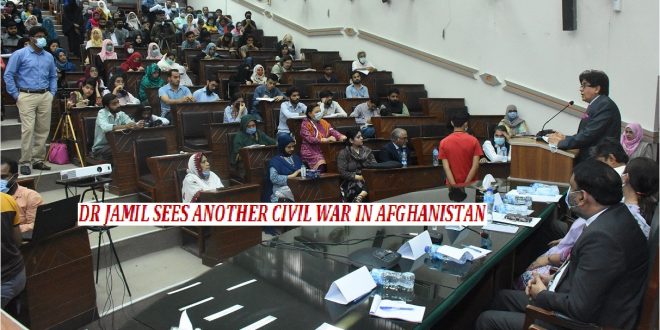04-11-2021
By SJA Jafri + Bureau Report + Agencies
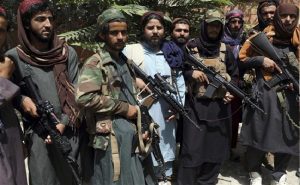 KABUL/ KARACHI/ ISLAMABAD: The supreme leader of the Taliban warned on Thursday against the danger of turncoats and infiltrators in the movement that has taken charge of Afghanistan.
KABUL/ KARACHI/ ISLAMABAD: The supreme leader of the Taliban warned on Thursday against the danger of turncoats and infiltrators in the movement that has taken charge of Afghanistan.
Reflecting the seriousness of the threat, the reclusive Haibatullah Akhundzada issued a rare written public statement to urge Taliban commanders to purge their ranks.
In it he says “all those elders of their groups must look inside their ranks and see if there is any unknown entity working against the will of the government, which must be eradicated as soon as possible.
“Whatever wrong happens, the elder will be responsible for the consequences of the actions in this world and in the afterlife,” he warned, in a statement tweeted out by multiple Taliban accounts.
The movement seized power in August after overrunning the capital and ousting the collapsing US-backed government, declaring a new Islamic Emirate of Afghanistan but after 20-years of guerrilla warfare, the Taliban has been forced to expand their ranks rapidly by recruiting former foes, allied militants and young madrassa students.
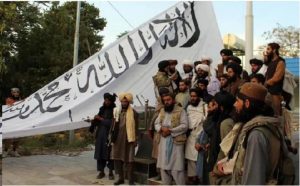 Now that it is the government, the movement faces attacks in its turn from hardline factions like the Daesh-Khorasan (Daesh-K).
Now that it is the government, the movement faces attacks in its turn from hardline factions like the Daesh-Khorasan (Daesh-K).
The groups are now bitter rivals, but there has been movement between them over the years and they both employed tactics like suicide bombings and civilian massacres to destabilise the former regime.
On Tuesday, at least 19 people including a Taliban commander were killed in a gun and suicide bomb attack claimed by Daesh-K on a military hospital in the heart of Kabul.
Taliban commanders insist that they can re-establish stability and security, but there have also been killings blamed on Taliban elements or extremist infiltrators.
Last week, for example, gunmen who presented themselves as Taliban shot dead three wedding guests in a dispute about the playing of music, which the movement frowns upon.
Taliban spokesman insisted the killers were not acting under orders and promised they would be punished.
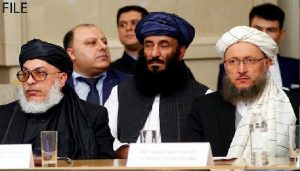 In his statement, Akhundzada said Taliban unit commanders must take the time to sit down with their recruits to “try to work on their manners and behaviour so that these mujahideen can work better for their leader.”
In his statement, Akhundzada said Taliban unit commanders must take the time to sit down with their recruits to “try to work on their manners and behaviour so that these mujahideen can work better for their leader.”
Meanwhile, the speakers at the international conference on “Afghanistan under Taliban: Implications for Pakistan and the Region” demanded the United Nations, United States of America, Russia, China, and other world forces play their due role in establishing durable peace and stability in Afghanistan and fulfill their commitments which they had made in the past and particularly in Doha, Qatar.
They observed that financial aid which is very crucial for Afghan people and government has not been restored yet which is creating a lot of problems for the interim Taliban government.
The former ambassador Dr Jamil Ahmed Khan, who was the keynote speaker at the international conference that was organized by the Department of International Relations University of Karachi at the Arts and Social Sciences Auditorium on Thursday, informed the 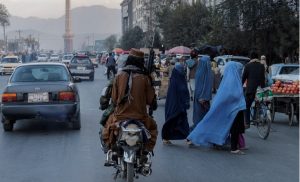 audience that the geostrategic and geopolitical position of Afghanistan is very pivotal and so far we have witnessed that instability in Afghanistan has the major effect around the world.
audience that the geostrategic and geopolitical position of Afghanistan is very pivotal and so far we have witnessed that instability in Afghanistan has the major effect around the world.
He mentioned that instability in Afghanistan will have instability in the region and particularly in Pakistan. While discussing US withdrawal from Afghanistan he posed a question that “Was it not a tactical retreat”? and shared his opinion with the audience that US withdrawal seems an organized destabilization of this region and that serves the interests of the USA because destabilization in the region would have negative impacts for Pakistan, China and Russia, and other countries.
He fears that if the US and the rest of the world did not restore the financial aid and support for Afghanistan then another civil war will be on the card. He said that the winter season is just around the corner and almost 95 percent of Afghanis do not have access to food and other basic necessities.
Another speaker, Michael Kugelman, Asia Program deputy director and senior associate for South Asia at the Wilson Center, Washington D.C., USA in his recorded presentation on 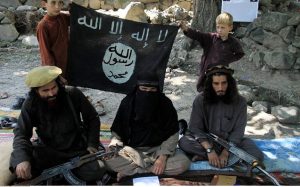 Regional Impacts of Afghanistan and implications for U.S policy, mentioned that how different states in the region are fearful about the situation in Afghanistan.
Regional Impacts of Afghanistan and implications for U.S policy, mentioned that how different states in the region are fearful about the situation in Afghanistan.
According to him, Russia fears Islamic State (I.S.) in the central Asian countries, China is also fearful about the Uyghur factor, India is fearful about Anti-India extremist groups and Pakistan is fearful about the TTP.
Kugelman said that he doesn’t think that the Taliban are going to curb TTP as it is in good hands with them. If the situation in Afghanistan goes well it would be better for the whole world and particularly for the region.
Meanwhile, the KU Vice Chancellor Professor Dr Khalid Mahmood Iraqi said that we are still paying the price for the decisions made during the late ’70s. The largest numbers of Afghan refugees were settled in Pakistan than other countries, including Iran, but, as compared to Pakistan other countries did not witness the law and order situation, the culture of Kalashnikova, and drug trafficking.
He informed the audience that Iran has kept its country away from such things by implementing its strategy and law. The KU VC Professor Dr Khalid Iraqi advised that we need 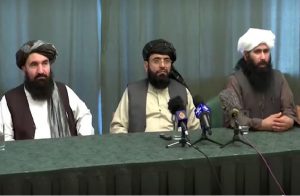 to formulate and implement a coherent and far-reaching foreign policy keeping in view the modern requirements, situation, interests, trade, and economic needs of the country rather than entertaining others.
to formulate and implement a coherent and far-reaching foreign policy keeping in view the modern requirements, situation, interests, trade, and economic needs of the country rather than entertaining others.
Meanwhile, the Chairperson Department of Peace and Conflict Studies, National Defence University (NDU), Islamabad, Dr Arshi Saleem, while discussing on Post-Taliban Takeover: Challenges of Terrorism in South-Asia said that there are specific threats of terrorism in and from Afghanistan and the political preferences of Taliban would tell that where they are going.
While discussing Pakistan’s concerns about TTP, she said, Taliban are in dilemma, if they curb TTP, it might join the hands of I.S. which is a rival of the Taliban and if they don’t, they might be having difficulties with the Pakistani government.
She observed that India is now more concerned about the rise of Taliban in Afghanistan because it can pose a greater threat for India, after BJP’s policies against Muslims, as pre-conditions exist in India and local militant organizations can have a larger regional network.
Dr Arshi Saleem mentioned that a rise in operational and violent activities is expected which will ultimately give a way for the U.S to come back to South Asia.
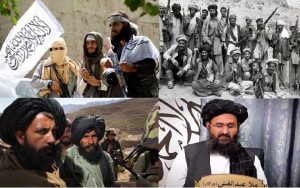 The former Dean Arts and Social Sciences KU Dr Monis Ahmer while discussing the nature of the Afghan State said that Afghanistan is 200 years older than Pakistan but it has been not able to settle down as a nation-state, it has been in a perpetual state of chaos and not been able to go normal.
The former Dean Arts and Social Sciences KU Dr Monis Ahmer while discussing the nature of the Afghan State said that Afghanistan is 200 years older than Pakistan but it has been not able to settle down as a nation-state, it has been in a perpetual state of chaos and not been able to go normal.
He warned that if the Taliban gets legitimacy they will show their real face which would be more brutal and lethal than this. For Afghanistan, the multi-stakeholders approach is the only solution.
On the other hand, the KU Dean Dean Arts and Social Sciences Professor Dr Nusrat Idress said that Afghanistan deserves peace as the country has already suffered the destruction of war for several decades. The impact of the war on Afghanistan has multiplied the challenges for Pakistan.
She mentioned that as a neighboring country, Pakistan has always supported Afghanistan and continues to stand by the Afghanis in these difficult times. She added that we cannot deny the fact that the Taliban’s takeover in Afghanistan has generated fear both within and across the country.
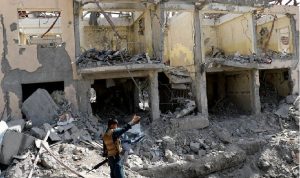 She said that Afghanistan’s economic stability and reconstruction is the most important challenge not only for the Taliban but for the entire region. A political and economically stable Afghanistan can reduce the burden on Pakistan.
She said that Afghanistan’s economic stability and reconstruction is the most important challenge not only for the Taliban but for the entire region. A political and economically stable Afghanistan can reduce the burden on Pakistan.
The Chairman IR Dr Naeem Ahmed said that common Afghani is still waiting for peace and stability in their hometown. He mentioned that the Taliban interim government is not internationally recognized to date and the security situation is still not improved in the country.
He said that economic fragility is directly affecting Afghani society and that is why conflict-stricken Afghanistan needs political and economical stability which is in the larger interest of not only the world at large but also the region and particularly Pakistan which has borne a heavy cost of unrest in Afghanistan.
Dr Greg Aasen, lecturer in Politics and International Relations at the University of Westminster, UK through video link while Dr Rashid Ahmed, Assistant Professor, Department of Peace and Conflict Studies, National Defence University (NDU), Islamabad and Professor Dr Syed Manzoor Ahmed, Dean, Faculty of Management and Social Sciences, Lasbela University, Balochistan also spoke on this occasion.
 Pressmediaofindia
Pressmediaofindia
